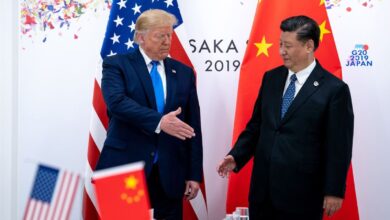
India and Pakistan on Tuesday traded barbs over the death sentence handed out by Islamabad to alleged Indian spy, Kulbhushan Jadhav, after New Delhi took strong objection to the trial process.
Jadhav, who India accepts is an Indian national but claims has no links to its research wing, was accused by Pakistan of spying in its restive province of Balochistan. Jadhav was a former Indian Navy commander and was reportedly carrying out a business from Iran.
The trial was completed within three months by a Pakistan military court which found Jadhav guilty of “espionage and sabotage activities”, prompting New Delhi to warn Islamabad that it is a case of “premeditated murder”. The trial proceedings that led to the capital punishment for Jadhav were also described by India as “farcical”. Jadhav was arrested on 3 March 2016 from Balochistan, according to Pakistan, whereas New Delhi claims he was abducted and is now being harassed as part of a larger conspiracy by Pakistan to malign India.
Pakistani side has repeatedly alleged that Jadhav is a Research and Analysis Wing (RAW) “spy” in Pakistan’s restive Balochistan province. Pakistan claims its security forces had arrested Jadhav
from the restive Balochistan province on 3 March last year after he reportedly entered from Iran. It also claimed that he was “a serving officer in the Indian Navy.” The Pakistan Army had also released a “confessional video” of Jadhav after his arrest.
According to the Inter-Services Public Relations statement, Jadhav, a commander in the Indian Navy, “confessed” before a Magistrate and the court that he was “tasked by RAW to plan, coordinate and organise espionage/sabotage activities aiming to destabilise and wage war against Pakistan by impeding the efforts of Law Enforcement Agencies for restoring peace in Balochistan and Karachi.”
It also claimed that Jadhav alias Hussein Mubarak Patel was “provided with defending officer as per legal provisions”.
India has issued a strong worded condemnation and warned Pakistan of consequences on bilateral relations, if it chooses to see through the execution. India said that the death sentence would be akin to “premeditated murder” if Pakistan carries out the death sentence “without observing basic norms of law and justice”.
India had repeatedly sought consular access to Jadhav, as provided for by international law and 13 such requests were formally made between 25 March, 2016 and 31 March, 2017, the demarche said. Pakistan, however, turned these requests down each time.
The proceedings that have led to the sentence against Jadhav are “farcical in the absence of any credible evidence” against him, it said, adding it is significant that Indian High Commission was not even informed that Jadhav was being brought to trial.
“Senior Pakistani figures have themselves cast doubt about the adequacy of evidence. The claim in the ISPR release that Jadhav was provided with a defending officer during the so-called trial is clearly absurd in the circumstances. “If this sentence against an Indian citizen, awarded without observing basic norms of law and justice, is carried out, the government and people of India will regard it as a case of premeditated murder,” Foreign secretary S Jaishankar said in the demarche.
Reacting to the issue, Union Home Minister Rajnath Singh also took a tough stance in the Parliament as he told the House that the government will do whatever it takes to ensure his release.
“We will do whatever it takes to ensure Jadhav’s release. If needed we will take the issue to international fora,” the Home Minister asserted.
“Let me state clearly that the government and the people of India would view very seriously the possibility that an innocent Indian citizen is facing death sentence in Pakistan without due process and in violation of basic norms of law, justice and international relations,” she said.
The Parliament too stood in solidarity on the issue and condemned Islamabad for openly flouting international norms on trying a foreign national.
India has maintained that it believes that Jadhav fell prey to a larger conspiracy and went out of India only to carry out a business. India also points out the dubious ways in which Pakistan kept the lid over the entire trial process.
Denying a foreign national consular access, and hence a defendant of his choice, is a blatant departure from established international practice. Moreover, Pakistan has so far not produced any other proof except an alleged confessional video, which India states is tutored or recorded under immense mental and physical pressure. Then there are several inconsistencies in the video which further cast a shadow of doubt on the circumstances in which it was recorded.
Firslty, the video has multiple quick edits and the audio appears to go out of sync from time to time, which indicates it was likely to have been shot under duress. Then, Jadhav’s facial expressions, at many instances, do not match to what is being said. The audio too is poorly spliced.
Interestingly, Pakistani Prime Minister’s advisor on foreign affairs, Sartaj Aziz had reportedly told the Pakistan senate on December 7 that the “dossier” on Jadhav were “mere statements” and that it did not have any “conclusive evidence”. He even had said that the material was “insufficient”, adding “now it is up to the concerned authorities how long they take to give us more matter on the agent.”
Jadhav’s family hails from Sangli, Maharashtra and his father is Sudhir Jadhav, who retired as a Assistant Commissioner in Mumbai Police officer. His uncle Subhash Jadhav, is also a Police officer and was part of the investigation team probing the hit-and-run case against Bollywood actor Salman Khan.
Jadhav lived at his Powai residence, with his father, mother Avanti Jadhav, wife and two children. However, since the news of his death sentence has come out, his family has relocated to an unknown location in view of their safety. As a precaution, the police deployed around half a dozen constables outside the premises while some policemen visited the family living on the fifth floor.
Jadhav joined joined the Navy in 1987, and according to his passport was born in 1968. He later quit the Navy in 2002 to start his own business.
How likely is it for a trained RAW agent to be travelling with an Indian passport. Rajnath raised the same question. That apart, in the so called “confessional” video, Jadhav claims to have had direct links with senior RAW officials, which is again highly unlikely that an intelligence appointee been given direct access to senior officials.
The Pakistani inclination to keep the trial under wraps also throws up some suspicion. While trying a foreign national accused of spying is not unusual, sentencing someone to death within a scope of three months without even granting him consular access is highly unusual. After all, notwithstanding the frosty relationship the two nations share, India and Pakistan are not at war. Add to this the fact that even Pakistani politicians have their reservations about the military courts.
Sample this, Pakistan People’s Party Senator Farhatullah Babar had argued that the “practice of military courts pronouncing death penalty against unnamed accused by unnamed judges sitting at an undisclosed location and without any mention of charges, the case of the prosecution, the defence plea and disallowing independent observers violated the requirements of adequate procedural safeguards.”
Moreover, Former German ambassador to Pakistan, Dr Gunter Mulack, has also contradicted Pakistan’s version of the story stating Jadhav was arrested in a counter intelligence operation. According to a report in Dawn published at the time of Jadhav’s arrest, Mulack has said that “the Indian spy recently arrested in Balochistan was actually caught by Taliban and sold to Pakistani intelligence”.
Top US experts have also expressed concern over the way Pakistan handled this case. “Apart from the gross irregularities in the Jadhav situation, such as the lack of consular access and the secrecy surrounding the surprise court-martial, what struck me the most is the contrast between the speed of Mr Jadhav’s trial set against the endless postponements for that of the Mumbai attackers,” Alyssa Ayres, a former senior State Department official in its South and Central Asia Bureau said.
On the flip side, there are some facts that need an answer. A report in The Indian Express quotes some “highly placed intelligence offcials” who say that Jadhav had approached the RAW “several times between 2010 and 2012 offering his services as a freelance intelligence operative.” The report however states that Jadhav was turned down each time as RAW officials saw him as “too much of a risk.” Jadhav was financially on an edge, when he approached RAW, as his business was not paying off well. The same report also claims that Jadhav indeed had multiple fake identities as Pakistan claims. “Jadhav conducted his business in Iran using an illegally obtained Indian passport, E6934766, identifying him by the pseudonym Hussein Mubarak Patel… Later, in 2014, Jadhav obtained a second passport, this time giving the address of a flat in Thane owned by his mother, Avanti Jadhav,” the report states.
Firstpost correspondent also independently confirmed that Jadhav owns three properties in Mumbai, and is known under the alias Mubarak Patel. Nobody in the area where he lived, knew him as Kulbhushan Jadhav.
Another report in The Scrollargues that Jadhav’s job, in all likelihood, was to collect naval intelligence relating to Karachi and Gwadar which he successfully managed from Chabahar. It uses the fact that Pakistan has only made general allegations that Jadhav was involved in some activities in Balochistan, without detailing on any exact instances. Now it is no secret that India has strategic interests in the Chabhar, Gwadar port area and it has been involved in back channel diplomacy to secure its interests in the region. Perhaps Jadhav was merely tasked to collect naval intelligence inputs.
Whatever was the case, India maintains that the justice system was flawed, arbitrary and farcical and the fact that Pakistan didn’t risk the scrutiny of a civil court in itself proves that the entire narrative is ridden with loopholes and cooked up to malign India.





